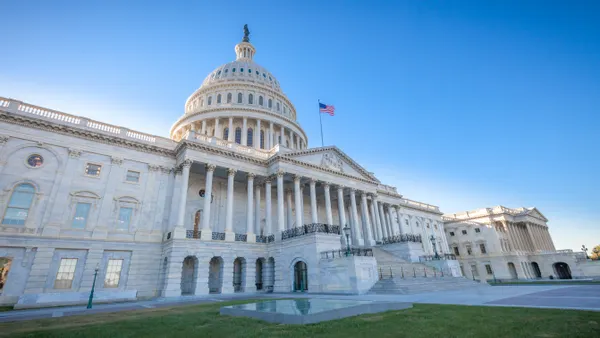Dive Brief:
- The New Jersey General Assembly passed Assembly Bill No. 1958 on Thursday, paving the way for new legislation concerning hospitality franchising agreements and moving the bill along to the state’s Senate.
- The bill would serve as a supplement to the state’s existing franchise-related legislation with hotel-specific regulations that would limit hotel franchisors’ ability to sell loyalty points for profit. It would also regulate franchisors’ use of preferred vendor programs, among other stipulations.
- American Hotel & Lodging Association President Chip Rogers blasted the bill’s passage in a statement, saying it “would significantly harm tourism throughout the Garden State.” But the Asian American Hotel Owners Association supported the bill, calling it a “stand for fairness in franchising.”
Dive Insight:
After Assembly Bill No. 1958, sponsored by Democratic New Jersey Assembly members Raj Mukherji, Robert Karabinchak and Wayne DeAngelo, passed the state’s General Assembly, the hospitality community issued a range of reactions.
The bill asks that hotel franchisors not require franchisees to purchase goods and services only from mandated vendors, unless there are no other options, and it would require franchisors to disclose when they receive commissions or rebates.
Hotel brands would also not be allowed to sell loyalty points for profit without disclosure and “reasonable compensation” for the hotel owners. Additionally, the bill requires franchisors to be more transparent with franchisees about forthcoming fees.
In the AHLA statement, Rogers said the bill would “completely undermine the foundation of hotel franchising by limiting a brand’s ability to enforce the quality standards guests know and trust.”
Rogers also said it would create hurdles for hotel loyalty programs by making it difficult for guests to use or accrue points while staying at New Jersey hotels. The result, he said, would be hotels leaving — or limiting new developments in — the state.
The International Franchise Association also condemned the bill. In a statement, IFA Vice President of State Government Relations Jeff Hanscom called the potential legislation a “fundamental dismantling of the franchise business model,” saying that it will make it harder for hotels “to do business and serve their guests at a time when they are still trying to recover from the worst effects of the pandemic.”
Conversely, an AAHOA statement said the bill “would ensure greater fairness in the system and strengthen protections for franchise businesses.”
Laura Lee Blake, president and CEO of AAHOA, worked with New Jersey Assembly member Mukherji on the bill. “It’s not impacting the customer or their loyalty programs. It's not impacting brand standards. It's really just trying to add some fairness back in, especially with some of the things that have developed since COVID-19,” she told Hotel Dive.
In 2020, she noted, Hilton sold points from its Hilton Honors program to American Express for $1 billion, and Marriott sold Marriott Bonvoy points as part of a $920 million deal to the same company, while hotel owners saw none of the dividends. “So if [the companies] have to reasonably reimburse their hotel owners, maybe they can't profit that entire amount [...] but I can’t imagine it would ruin the [loyalty] programs,” she said, contesting Rogers’ claims.
Blake also noted that franchisees had seen an uptick in surprise fees since the pandemic, something the bill is intended to push back against by requiring more disclosure of fees from franchisors.
She added that the bill has been amended since its first introduction to take out anything that would impact brand standards or the guest experience.
AHLA still believes that “the bill would limit a brand’s ability to enforce its own brand standards,” a spokesperson for the organization told Hotel Dive. The spokesperson said that brands would be required to negotiate new services for guests property by property, leading to inconsistent guest experiences. The association also believes the bill would restrict how loyalty points are reimbursed, leading to limitations on the availability and use of loyalty points in the state, the spokesperson added.
Due to ongoing budget debates in the New Jersey legislature, Blake expects the bill won’t reach the state’s Senate until this fall.










